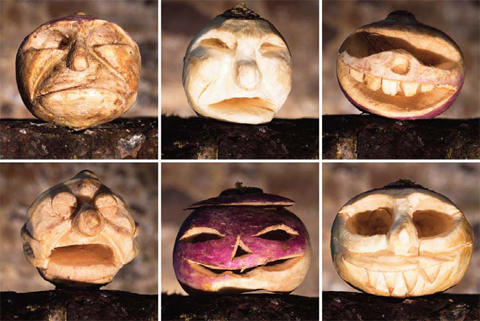 A combination of handout pictures released by English Heritage on October 26, 2015 shows carved turnip faces at Dover Castle, southern England ahead of Halloween. — AFP photos
A combination of handout pictures released by English Heritage on October 26, 2015 shows carved turnip faces at Dover Castle, southern England ahead of Halloween. — AFP photosBritons should go back to the indigenous tradition of carving turnips instead of pumpkins for Halloween, even though they are harder to cut, the conservation charity English Heritage said on Monday. "English Heritage is calling on people to rediscover the original carved decoration, the humble turnip," the group said in a statement that delved into the British and Irish roots of Halloween revelry. "Long before the pumpkin became the Halloween decoration of choice, people across the British Isles carved scary faces into turnips and placed them near doorways to frighten away evil spirits," it said.
English Heritage said the original "Jack-o'-lantern" came from a folk tale about a man named Jack who was cursed to roam the earth using only a burning coal inside a hollowed-out turnip to light his way. Carved beets and potatoes were also sometimes used. The tradition migrated in the 19th century to the United States, where immigrants found that pumpkins-a native American fruit-were easier to carve.
Britons now mostly carve pumpkins for Halloween even though it is seen as an imported American tradition. Swedes and turnips are still widely used in northern Britain, however, and in Scotland the tradition of "guising"-a form of trick or treating-has also survived. "I don't think turnips are going to replace pumpkins, they are more difficult to carve, but hopefully people will remember the turnip and all our other rich traditions this Halloween," said Michal Carter, an English Heritage historian. Halloween originates from an ancient Celtic festival held around November 1 -- a time marking the transition from autumn to winter when the souls of the dead were believed to revisit their homes.-AFP










